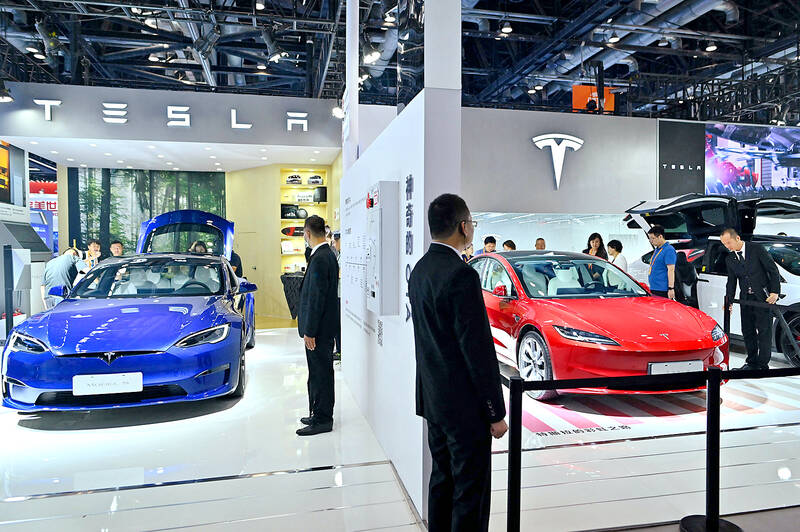Tesla Inc’s job cuts are escalating in China, sources familiar with the matter said, as Elon Musk contends with growing pressure to win back share in the world’s biggest auto market.
Additional layoffs began earlier this week, extending cuts from last month, as part of the electric vehicle (EV) maker’s pledge to slash global headcount by more than 10 percent, said the sources, who asked not to be identified as they are not authorized to disclose the information publicly.
The latest move affects a range of departments, including customer service staff, engineers, production line workers and the logistics team at Tesla’s Shanghai plant — home to more than half the company’s global production, the sources said, adding that the layoffs last month more directly impacted sales representatives.

Photo: AFP
It is unclear how many people would be affected and what impact it might have on Tesla’s China operations. The company’s China-based representatives did not immediately respond to requests for comments.
A global slowdown in EV demand has sparked Tesla’s biggest layoffs. However, the hit has been particularly acute in China, where intense competition from rivals like BYD Co and weak consumer sentiment is hurting sales. Shipments from its Shanghai factory dropped 18 percent last month even as the overall market for new energy vehicles grew 33 percent.
Tesla’s China market share shrank to about 7.5 percent in the first quarter of this year, from 10.5 percent in the same period last year, Bloomberg News calculations showed.
In addition to the ongoing cuts, Tesla’s China business would see the return of Tom Zhu (朱曉彤), who previously headed the automaker’s Asia-Pacific operations and led its entry into China, Bloomberg News reported on Wednesday. Zhu had been promoted to senior vice president of automotive in April last year, overseeing global production, sales, deliveries, service and the company’s factories from Tesla’s Austin headquarters.
The layoffs come despite Tesla winning in-principle approval from government officials to deploy its driver-assistance system in China, which would be an immediate revenue boost. It was granted the approval under certain conditions and managed to clear two important hurdles: Reaching a mapping and navigation deal with Chinese tech giant Baidu Inc, and meeting requirements for how it handles data-security and privacy issues.
Most of the laid-off employees in China would receive a payout equivalent to one month’s pay for every year worked, plus an additional three months’ salary, sources familiar with the matter said.
Some staff were escorted out of their workplaces by managers and some left in groups via shuttle buses, one of the sources said.
Globally, a growing number of executives have left Tesla, most of the company’s 500-person Supercharger team and its newly formed marketing team have been axed, and the automaker is rescinding offers just weeks before internships were set to start.

Intel Corp chief executive officer Lip-Bu Tan (陳立武) is expected to meet with Taiwanese suppliers next month in conjunction with the opening of the Computex Taipei trade show, supply chain sources said on Monday. The visit, the first for Tan to Taiwan since assuming his new post last month, would be aimed at enhancing Intel’s ties with suppliers in Taiwan as he attempts to help turn around the struggling US chipmaker, the sources said. Tan is to hold a banquet to celebrate Intel’s 40-year presence in Taiwan before Computex opens on May 20 and invite dozens of Taiwanese suppliers to exchange views

Application-specific integrated circuit designer Faraday Technology Corp (智原) yesterday said that although revenue this quarter would decline 30 percent from last quarter, it retained its full-year forecast of revenue growth of 100 percent. The company attributed the quarterly drop to a slowdown in customers’ production of chips using Faraday’s advanced packaging technology. The company is still confident about its revenue growth this year, given its strong “design-win” — or the projects it won to help customers design their chips, Faraday president Steve Wang (王國雍) told an online earnings conference. “The design-win this year is better than we expected. We believe we will win

Chizuko Kimura has become the first female sushi chef in the world to win a Michelin star, fulfilling a promise she made to her dying husband to continue his legacy. The 54-year-old Japanese chef regained the Michelin star her late husband, Shunei Kimura, won three years ago for their Sushi Shunei restaurant in Paris. For Shunei Kimura, the star was a dream come true. However, the joy was short-lived. He died from cancer just three months later in June 2022. He was 65. The following year, the restaurant in the heart of Montmartre lost its star rating. Chizuko Kimura insisted that the new star is still down

While China’s leaders use their economic and political might to fight US President Donald Trump’s trade war “to the end,” its army of social media soldiers are embarking on a more humorous campaign online. Trump’s tariff blitz has seen Washington and Beijing impose eye-watering duties on imports from the other, fanning a standoff between the economic superpowers that has sparked global recession fears and sent markets into a tailspin. Trump says his policy is a response to years of being “ripped off” by other countries and aims to bring manufacturing to the US, forcing companies to employ US workers. However, China’s online warriors